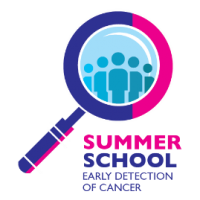 Post written by: Dr Charlie Massie and Dr Daniel Muñoz Espín, Group Leaders, CRUK Cambridge Centre Early Detection Programme.
Post written by: Dr Charlie Massie and Dr Daniel Muñoz Espín, Group Leaders, CRUK Cambridge Centre Early Detection Programme.
In July this year the inaugural International Early Detection Summer School, supported by the CRUK Cambridge Centre Early Detection Programme and the International Cancer Early Detection (ICED) Alliance, was held in the beautiful surroundings of Robinson College, Cambridge. The major theme of ‘Discovery and Development of Diagnostics for Early Detection of Cancer’ was delivered by world-class international Faculty, and the diagnostic development themes were explored more deeply in small groups through an interactive Team Activity.
This was a truly international summer school with 60 delegates attending from 32 different institutions across 7 countries. The international faculty and speakers consisted of world leaders from a diverse range of specialities, including regulatory authorities, international certification bodies, large and small biotechnology companies, and academics focussed on cancer early detection.
The Summer School provided insights from experts with real-world experience in developing diagnostics and key lessons learnt on the pathway to implementation. The speakers covered topics ranging from the need for cancer early detection and emerging technologies, to case-studies and clinical trials from successful pioneers in the field of Early Detection, including regulation and policy challenges of new screening and diagnostic tools.
Talks from Rebecca Fitzgerald (CytospongeTM), Nickolas Papadopoulos (CancerSEEK), Barry Berger (Cologuard®), Henrik Winther (IMMray TM), and Attila Lorincz (digene HC2 HPV DNA test) were among the success stories that covered development from concept to clinical trials and considerations for implementation of cancer early detection in a variety of malignancies. Stephen Quake (Stanford) and Chris Contag (Michigan State) covered exciting new technologies for cancer detection, ranging from molecular analysis to optical imaging. Challenges for real-world impact and implementation were covered from a broad range of perspectives by Anne Mackie (Public Health England), Maroeska Rovers (Radboud), Alberto Gutierrez (former FDA Director), Sian Taylor-Phillips (Warwick) and Robyn Meurant (NSF International). Considerations for the design of clinical trials and early detection of cancer in primary care were expertly covered by Peter Sasieni (King’s College London) and Fiona Walter (Cambridge/CanTest). The balanced programme concluded with a final session of speakers covering the specific challenges for development in this area, both from a regulatory perspective and considerations for the societal impact of cancer early detection. Talks from Lynette Reid (Dalhousie), Stephen John (Cambridge) and Maryon McDonald (Cambridge), actively moderated by Stuart Hogarth (Cambridge), one of the co-organisers of the Summer School, gave much food for thought on the potential impacts of early detection. Discussions included the importance of clarity in communicating with target ‘testing’ populations, as well as the need to ensure that any new early detection test strikes the correct balance between benefits and harms, to realise the core goal of ‘timely detection’ of lethal cancers to improve survival rates.

Throughout the four-day Summer School five ‘scrum masters’ trained by Carl Yamashiro (College of Health Solutions, Arizona State University), including Wendy Alderton, Charlie Massie and Daniel Munoz-Espin (CRUK Cambridge Centre Early Detection Programme), Valerie Sills (Public Health and Primary Care, Cambridge), and Cindy Azevedo (College of Health Solutions, Arizona State University), supervised a team activity that worked through the stages of developing an early detection test. Working in small groups after each session, delegates covered in greater depth the diagnostic development process starting from concept and ideation, through considerations for specific technologies, practicalities for implementation, quality systems, assessing competition and IP, regulation, reimbursement, marketing, and final commercialisation. Using a tailored agile development programme, implemented together with the team from Arizona State University, delegates were mentored through the complexities and considerations for realising cancer early detection diagnostics. The team development activity culminated in a series of short presentations at the end of the Summer School and the award of the first International Early Detection Prizes!
The feedback for the event was very positive, with 100% of delegates agreeing that the course was well organised and met the key objectives for the topics of Developing Diagnostics for Cancer Early Detection. Specific feedback from attendees:
“Amazing range and level of speakers”
“Cytosponge, CancerSEEK, Quake, Immunovia, Cologard were amazing talks. Learned a lot about science, regulatory, clinical validation, societal elements”
“Excellent range of talks, great presenters across the board”
“It was a really good multidisciplinary event and I enjoyed having the opportunity to network with researchers that are tackling the early detection problem from such different viewpoints.”
In conclusion, the first International Early Detection Summer School brought together an outstanding team of senior faculty, speakers, associates, and delegates from multiple international institutions sharing the vision of increasing survival from cancer and improving quality of life through early detection and intervention. We are already planning the next International Early Detection Summer School, so watch this space and look out for email alerts to make sure you don’t miss out on the next Summer School!
The views expressed are those of the author. Posting of the blog does not signify that the Cancer Prevention Group endorse those views or opinions.
Share this page

